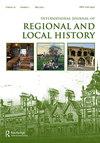挑战南非地方/区域历史研究的传统方式:一些全球学习与分享
Q2 Arts and Humanities
International Journal of Regional and Local History
Pub Date : 2014-05-01
DOI:10.1179/2051453014Z.00000000015
引用次数: 2
摘要
南非正式的区域/地方史研究实践已有近50年的历史。在许多方面,它的发展与欧洲和其他地区的趋势密切相关。这项研究是在各种农村和城市发展、主题和现象的保护伞下直观地或可能有意地进行的;本文分析了南非人文社会科学对历史学家和其他学者的一些国际影响。然而,在区域环境中组织良好的综合研究可能是迈向包容性区域历史的唯一途径。在这方面,研究区域历史的历史学家可以在区域研究的精神中更“历史性”地构建他们的研究贡献,而不是“主题政治”,地理学要么显得突出,要么显得次要。这个领域的历史学家也被指责在没有哲学基础和健全的认识论的情况下运作。世界各地的地区历史学家应该重新对这些挑战进行批判性思考。本文提出了重新思考这一历史领域的观点,以期推动这一争论。文章还通过南非地方/区域历史的史学,但在全球背景下,告知这一过程。在研究方法上,提出了一些关于地域性和人域性的新思路,统一为“历史地域性”,以供进一步探讨。本文章由计算机程序翻译,如有差异,请以英文原文为准。
Challenging Traditional Ways of Constructing Local/Regional History Research in South Africa: Some Global Learning and Sharing
Abstract Formal regional/local history research practice in South Africa is very nearly 50 years old. In many ways, its development was closely associated with trends in Europe and elsewhere. This research was intuitively, or perhaps intentionally, produced under the umbrella of a variety of rural and urban developments, themes and phenomena; and some of these international influences on historians and other academics that surfaced in the humanities and social sciences in South Africa are analysed in this article. However, well-organised integrative research in a regional environment may be the only way to progress towards inclusive regional histories. In this regard, historians dealing with regional history can frame their research contribution more “historically” in the spirit of regional research, rather than “thematic-politically”, with geographies that either appears to be accentuated or peripheral. Historians in this field have also been accused of operating without a philosophical base and a sound epistemology. These challenges should be given some renewed critical thought by regional historians all over the world. In this article, ideas for rethinking this field of history are put forward in an effort to progress this debate. The article also informs this process through the historiography of local/regional history in South Africa, but within a global context. Some new thinking on place and people in regional history, with regard to research methodologies, unified as “historical regionalism”, is also offered for further debate.
求助全文
通过发布文献求助,成功后即可免费获取论文全文。
去求助
来源期刊

International Journal of Regional and Local History
Arts and Humanities-History
CiteScore
0.30
自引率
0.00%
发文量
10
期刊介绍:
The International Journal of Regional and Local History aims to publish high-quality academic articles which address the history of regions and localities in the medieval, early-modern and modern eras. Regional and local are defined in broad terms, encouraging their examination in both urban and rural contexts, and as administrative, cultural and geographical entities. Regional histories may transcend both local and national boundaries, and offer a means of interrogating the temporality of such structures. Such histories might broaden understandings arrived at through a national focus or help develop agendas for future exploration. The subject matter of regional and local histories invites a number of methodological approaches including oral history, comparative history, cultural history and history from below. We welcome contributions situated in these methodological frameworks but are also keen to elicit inter-disciplinary work which seeks to understand the history of regions or localities through the methodologies of geography, sociology or cultural studies. The journal also publishes book reviews and review articles on themes relating to regional or local history.
 求助内容:
求助内容: 应助结果提醒方式:
应助结果提醒方式:


